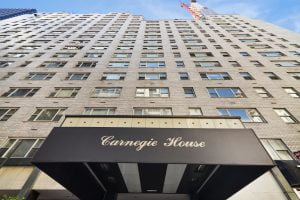Difference Between A Condo And An Apartment In NYC (2025)
July 7, 2022 by Ossiana Tepfenhart
Go Back To Previous Page
An apartment is a general term for a separate residence within a larger building. Finding a place to live will always be a hassle; part of it is learning the difference between your options. In the magical city of New York, there are two main types of housing people desire: condos and apartments. They often look identical, too. So, what’s the difference between the two, anyway? Apartments are generally entire buildings owned by one person or a company, with individual units rented out to residents.
Condos are buildings governed by an HOA but individually owned by people who live in them or rent them out. Understanding the differences between a condo and an apartment is essential before you start looking for properties.
Apartments in NYC can be individually owned condominium units, co-op apartments, or a single unit in a rental building that one landlord entirely owns. Many folks moving to New York City for the first time will be confused by the difference between a condo and vs. apartment.
Often, properties are listed simply as an “apartment” on real estate search websites, and homebuyers may become confused to find out later that it is a condo or a co-op. We’ll explain in this article the difference between a condo and vs. apartment in NYC.
What Are The Differences Between Condos And Apartments?
New York City is full of condos and apartments, but this doesn’t mean they are identical — even when they look that way. The main vital points below are the most commonly cited differences between the two:
points below are the most commonly cited differences between the two:
- Unless you own a whole apartment building, chances are you won’t find an apartment for sale. Condominiums are generally those that involve a transfer of ownership whenever someone moves in or out. A single landlord or company typically owns apartments rented out to tenants.
- Landlords can rent out Apartments in rental buildings and manage them. However, condos can be owned and then rented out. Apartments are rarely sold unit by unit. Meanwhile, condos are usually sold by unit, allowing owners to rent them out.
- You can get evicted from an apartment, not a condo. Condos are yours to own, so you legally must have an unpaid lien against you to get you out of there. Apartments can evict you, even if you have the money to pay your rent.
- HOAs manage condos; a landlord operates apartments. HOAs act as a community board that ensures everyone is satisfied with the quality of the building. They maintain common areas and ensure that you don’t harm your neighbor. Apartment landlords are liable for ALL repairs inside your unit and in the common areas.
- You pay taxes on a condo, which are typically included in your HOA fees. Apartments do not require direct payment of taxes to the state; it’s the landlord’s responsibility.
- Condominiums do not require you to renew your lease every year. Meanwhile, apartments typically require you to renew a lease annually.
- You build equity with a condo, not an apartment. A condo is YOUR property, and it’s a property that increases in value as you get older.
What’s a Condo in NYC?
A condo refers to an apartment that is individually owned and typically part of a larger condominium complex.
A condo building is where various individuals typically own all units. Ownership is not limited to one apartment per individual. For example, some owners may buy their neighbor’s apartment in NYC to combine the units into a larger one.
Furthermore, some investors may own multiple condos in the same building and other buildings. Therefore, the main difference between a condo and vs. apartment is ownership.
What Is a Co-op in NYC?
A co-op or
cooperative apartment is a unique form of living in New York City. Owners of co-op apartments are shareholders of a corporation that owns their entire building. Shareholders receive a stock certificate and a
proprietary lease that grants them the right to occupy their specific apartment. As a result, co-op shareholders are not owners of real property but rather owners of shares in a corporation that owns an apartment building.
A board of directors elected by the shareholder base runs the cooperative corporation.
Co-ops are known for their stricter rules and regulations, as well as sublet policies, compared to condos. The board of directors exercises considerable power over the shareholder tenants.
Co-op boards require potential purchasers or subletters to submit a lengthy and invasive co-op board application and pass a co-op board interview. Co-op boards can reject an application for any reason without having to disclose the reason for the rejection.
Although this can result in various forms of discrimination, most rejections occur because the applicant did not meet the co-op’s financial requirements.
Is It Easier To Get An Apartment Or A Condo?
Most people will find it easier to secure an apartment because of the funding issue and the approval process for moving in.
Apartments have strict regulations regarding what they can and cannot deny an applicant. Condo boards, though, have more lax requirements.

With funding, the issue is pretty straightforward. Condos usually require lenders to approve you for a loan, unless you can buy it with all cash. While choosing between a condo and an apartment, it’s also essential to understand the financial intricacies involved in owning a condo. This includes learning about condo financing, which encompasses the requirements and steps for securing a mortgage.
When this happens, you always risk having a sale fall through.
Is It Easier To Sell A Condo Or Leave An Apartment?
Apartments are generally easy to leave.
You must refuse to renew the lease for the next year and find a new apartment to rent. Selling a condo, though, can be tricky. The HOA can reject a new buyer’s application, even if they make an offer on the unit, which can cause your unit to take longer to sell.
Do You Still Have to Pay Monthly Fees If You Buy a Condominium?
Let’s say you buy the condo all cash. You might be under the belief that you won’t have to pay fees month-to-month, but that’s not the case. Every apartment will have mandatory monthly fees brought forth by the HOA.
These HOA fees cover common area maintenance, admin salaries, repairs to the building structure, and taxes.
Which Is More Expensive, A Condo Or An Apartment In NYC?
Blow by blow, studies have shown that New York City is a place where it’s almost always more affordable to rent than it is to own.
People who work in the city and want to live there already pay a premium price. Ownership, especially condos, comes with premium fees and a heavy tax burden.
Most people in New York are thrilled to rent for the rest of their lives. When you realize how much the price of homes can increase, it’s easy to see why some may find it better to sell their condo as a retirement vehicle later. So, both have their perks and pitfalls on a financial level.
Which Is Right For You, Apartments Or Condos?
Honestly, there is no single correct answer that works universally. Some people (like myself) want to be life-long renters simply because it is easier on them and makes sense for their financial needs. On the other hand, if you plan to build equity or potentially rent out your home, a condo may make more sense later.
Most real estate professionals would say that it makes more sense to consider each option on a case-by-case basis. So, ask a real estate broker if you need help figuring out what you should get; they often have the best advice.
 points below are the most commonly cited differences between the two:
points below are the most commonly cited differences between the two:


